Create an instant online store.
Get your 14-day free trial. Pick a professional template, start selling today, and upgrade anytime.



- Sellfy Blog
- Tips & tricks
- | by Aleksey Haritonenko , May 30, 2025
10 best Big Cartel alternatives in 2026 (free & paid)

There are several reasons why you should consider Big Cartel alternatives (such as Sellfy):
- Big Cartel’s free plan restricts you to only five products;
- No cart abandonment saving tool;
- Selling digital downloads requires paid third-party integrations;
- No built-in email marketing tool;
- Limited customization and themes.
Sellfy, on the other hand, addresses all these shortcomings. With Sellfy, you can enjoy a more comprehensive and seamless ecommerce experience.
In this guide, we will explore why Sellfy is a better alternative to Big Cartel and discuss other top ecommerce platforms to consider in 2026.
10 best Big Cartel alternatives
1. Sellfy
Sellfy is the top choice among Big Cartel alternatives, with a setup as simple as, or even better than, Big Cartel’s. You can begin selling instantly, setting up a store in under 10 minutes.
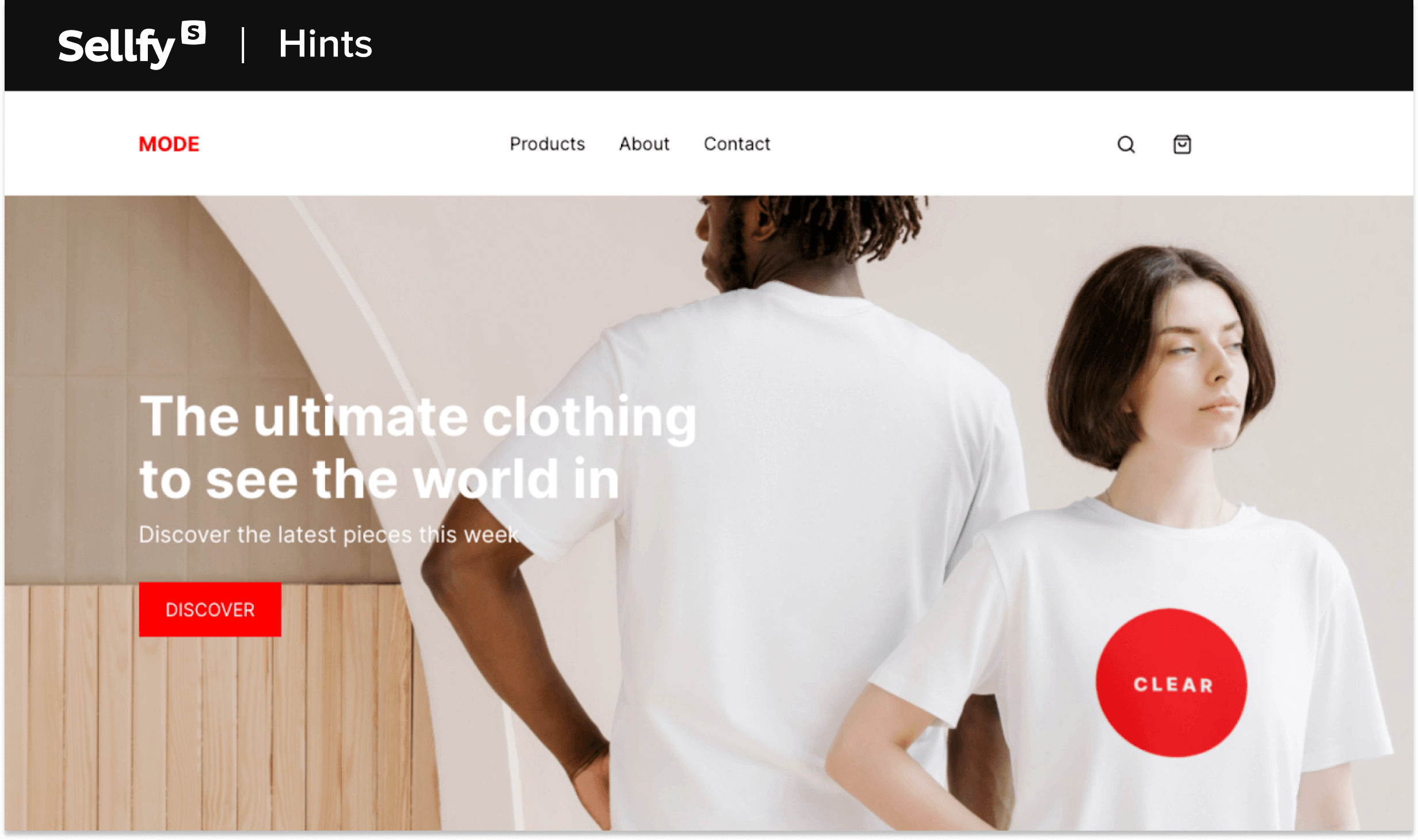
Sellfy slightly stands out among its other alternatives. It initially focused on digital products and swiftly became a leading eCommerce platform. It now offers features for selling physical products, subscriptions, and print-on-demand items without requiring integrations.
With Sellfy’s POD, you can effortlessly create and sell custom clothing, home decor, and accessories alongside digital and physical products. Embedding the “Buy now” button or the entire storefront into your existing website takes just a few clicks.

Learn how to sell online the simple way
See howSellfy provides powerful marketing tools for maximizing sales:
- Discounts and coupon codes with customizable start/end times, countdown timers, and SALE badges.
- Cart abandonment to recover lost sales.
- Pay-what-you-want pricing for increased customer engagement.
- Email marketing for crafting compelling campaigns, digital product updates, and “thank you” notes.
- Upselling and cross-selling to offer discounted additional digital products when buyers add items to their carts.
- Sellfy also offers a wider range of third-party apps than Big Cartel. Additionally, it integrates with Zapier, granting access to over 750 apps for further customization.
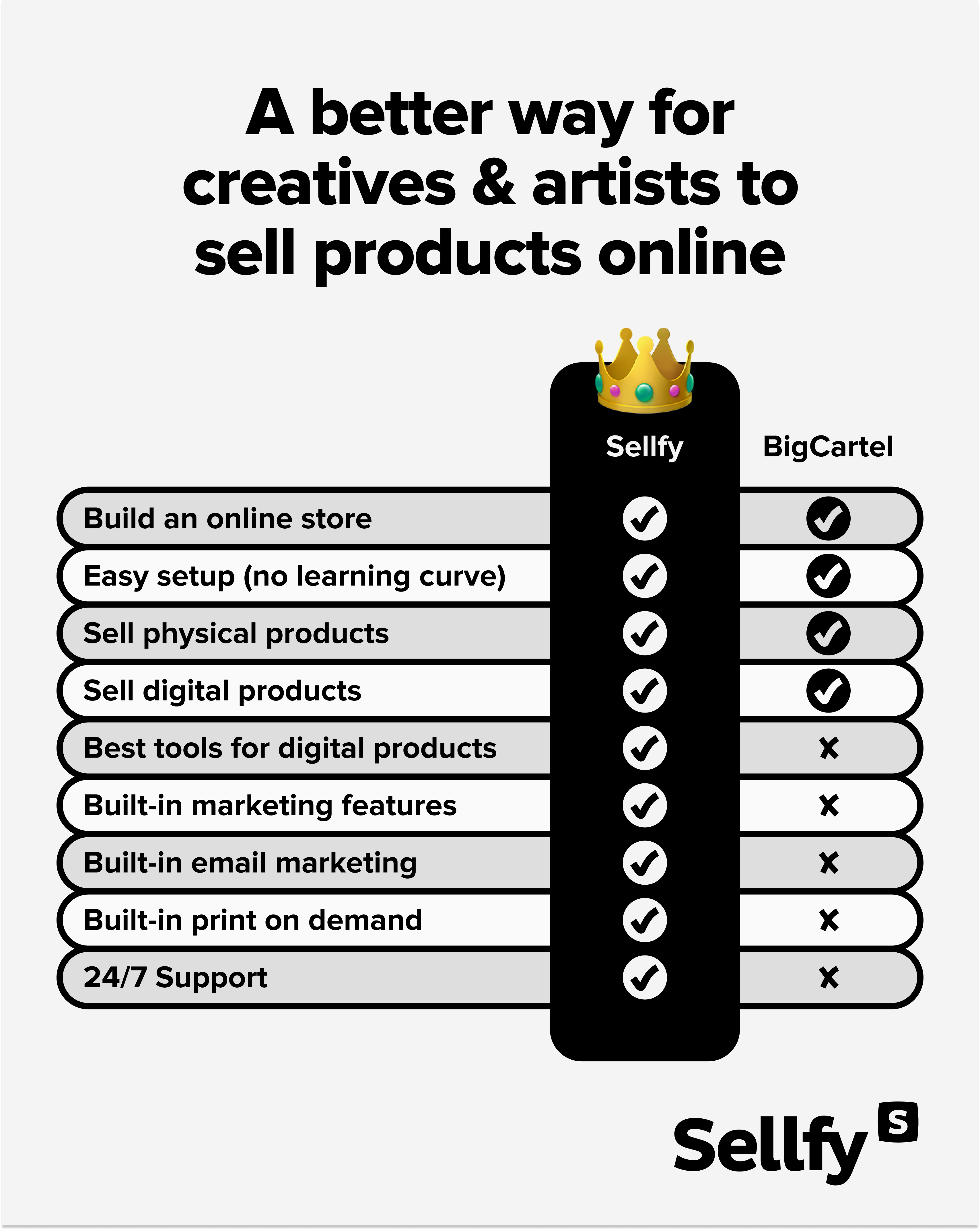
Is Sellfy right for you?
Even though Sellfy doesn’t target artists specifically, it’s the best Big Cartel (and Shopify alternative) for all types of creators who want to focus on their craft rather than technicalities.
How much does Sellfy cost?
Sellfy offers three paid plans, starting at $29/mo ($22/mo with a yearly subscription) with advanced functionality.
Pros
- Fully-hosted eCommerce platform
- Effortless setup
- Support for digital, physical & subscription products
- Built-in print-on-demand
- Built-in marketing tools
- Pay-what-you-want pricing
- Possibility to add a shopping cart to the website
- Sell unlimited products
- Mobile app as a bonus
- Accepts credit cards & PayPal
- Fast and clean checkout
- Google Analytics & more
Cons
- Limited integrations
- Limited customization & web design tools
- No advanced product filtering or sorting options
2. Gumroad
Gumroad is becoming the go-to platform for artists selling art online. It’s a simple eCommerce solution that gets you started quickly without hours of setup.
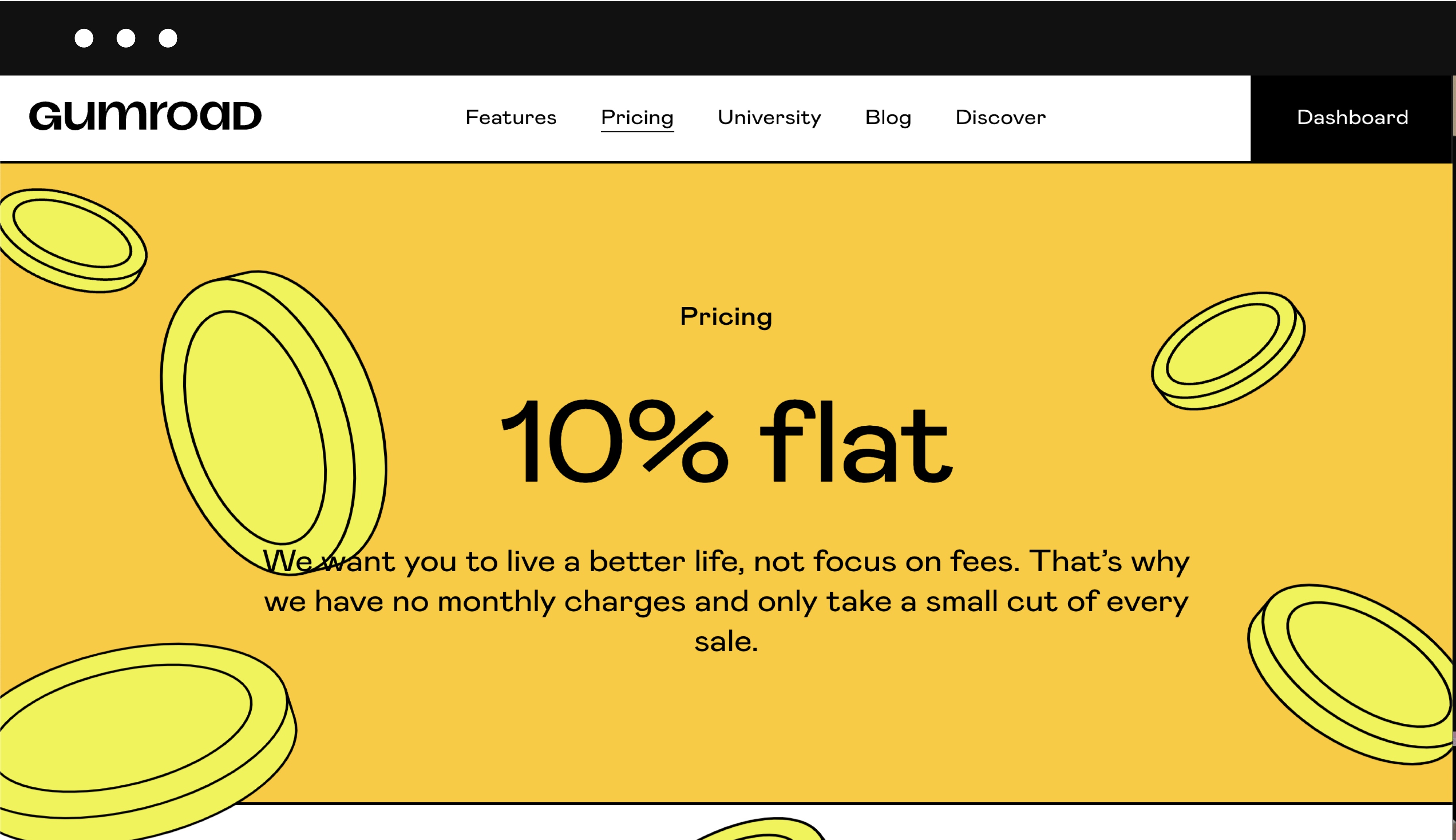
Like Sellfy, Gumroad supports both digital and physical products, making it a good choice for basic checkout needs. While it may not win awards for the best eCommerce platform, it’s user-friendly, customizable, and has a clean look.
Gumroad is also one of the most affordable options, although its transaction costs can add up. However, it lacks features like bump offers and product upselling.
Additionally, it doesn’t offer the same level of analytics and support as Sellfy.
Is Gumroad right for you?
Gumroad is suitable for artists new to eCommerce or seeking a basic checkout solution, but it may disappoint those seeking more advanced sales and marketing features.
How much does Gumroad cost?
Since January 30, 2021, Gumroad has removed paid plans, instead charging fees based on your lifetime revenue, beginning at 10%. Notably, Gumroad recently lost PayPal as a payout option, creating obstacles for creators in certain countries.
Pros
- Fully-hosted eCommerce platform
- Simple set up
- Free plan and reasonably priced paid plans
- Built-in membership platform that hosts audio, image & video files
- Supports digital and physical products
- Accepts credit cards & PayPal
- Built-in discount feature
- Store embed option
Cons
- No Apple Pay or other forms of payment processing
- No built-in marketing features
- Basic customization
- Poor Help Center & limited knowledge base
- No live chat or Facebook group
- No way to sell services
- Limited integrations
3. Shopify
Shopify remains one of the most popular eCommerce platforms due to its claim of being user-friendly. With the right app integrations, you can sell pretty much anything on Shopify—from physical products to services and digital goods.
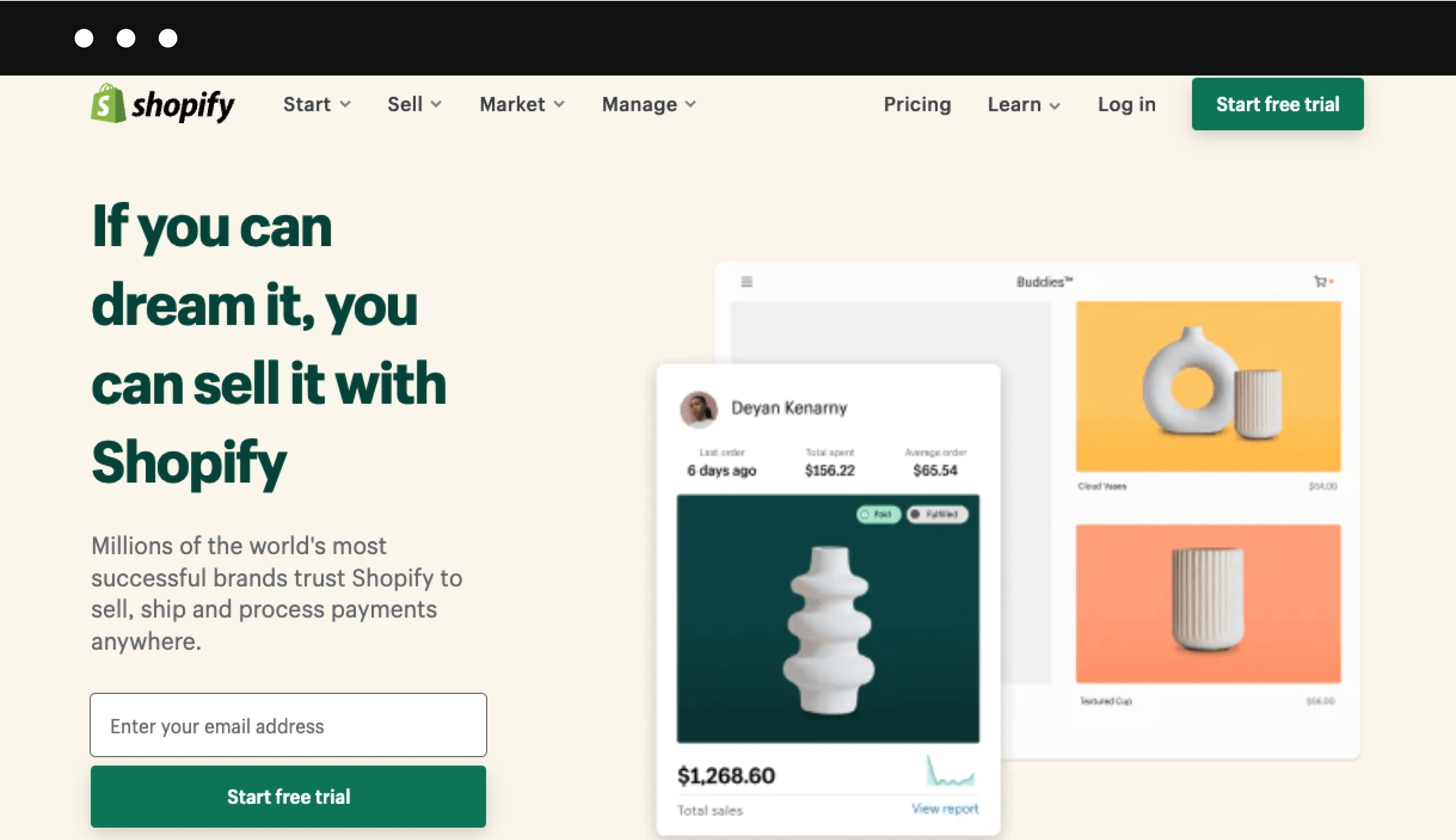
Shopify is highly feature-rich and provides essential tools for building an online store without coding.
But, additional costs for third-party app integrations are common, with store themes priced between $140–180 and monthly transaction fees varying from a few dollars to $100.
Compared to Shopify, Big Cartel and Sellfy offer more advanced built-in marketing tools for product promotion and increased conversions.
While Shopify markets itself as user-friendly, there’s a learning curve, evidenced by the abundance of “how-to” guides for starting a Shopify store.
Is Shopify right for you?
Overall, Shopify caters to businesses of all sizes, but building a fully functional store may require time and investment, particularly in third-party apps.
How much does Shopify cost?
Shopify doesn’t offer a free plan and has three paid monthly plans priced from $29–299/month.
Pros
- Fully-hosted eCommerce platform
- Marketplace with a wide choice of app integrations
- No coding experience required
- Built-in blog
- Store embed functionality
- Shopify app
- Multi-currency selling with Shopify Payments
- Built-in cart abandonment functionality
Cons
- Key functionalities require the installation of an app
- Third-party app integrations may be pricey
- Steep learning curve
- Multi-currency selling available only for Shopify Payment users
- Transaction & card processing fees
- Limited built-in marketing functionality
4. Ecwid
There are two types of platforms for building online stores: fully-hosted options like Big Cartel or Sellfy, and self-hosted solutions requiring coding skills or professional help.

Ecwid, however, doesn’t fit neatly into either category. It’s more like an advanced eCommerce widget designed to integrate with existing websites.
While different from Sellfy or Shopify, Ecwid’s free plan offers the opportunity to create a basic eCommerce website if you don’t have one.
Ecwid appears ideal for integrating store features onto existing websites and selling across various channels, but it lacks customization options.
Is Ecwid right for you?
Ecwid is usually the top choice for those familiar with the challenges of migrating products to an existing website.
How much does Ecwid cost?
Ecwid’s free plan allows you to sell 10 products and create a basic storefront, with paid plans ranging from $15–99/month.
Pros
- Designed to integrate well with social networks
- Effortless integration with your existing website
- Integrated store adapts to your site’s theme
- Automatically detects & translates 50+ languages
- Has a free plan
- No transaction fees
- GDPR compliant
- Supports multi-channel sales
- A basic eCommerce website builder
Cons
- Limited customization
- The free plan supports only 10 products
- No SEO editing in the free plan
- No possibility to edit product URLs for SEO purposes
- No support for product page AMP versions
- Impossible to build a complete eCommerce website on Ecwid
5. Etsy
Etsy is often the first platform that comes to mind for selling creative items. However, compared to fully-hosted eCommerce solutions, it’s a lot like selling your art at a fair rather than from your own store.

Etsy stands out as a creative marketplace, attracting a large customer base interested in arts and crafts.
With over 30 million potential buyers, there’s ample opportunity to draw attention to your products, though you’ll be competing with over 50 million sellers.
Additionally, Etsy offers its own eCommerce platform (Pattern by Etsy), similar to Sellfy but less customizable. It incurs a $15 monthly fee, serving primarily as an add-on for existing an Etsy store owner.
Is Etsy right for you?
Ideal for novice artists seeking simplicity without customization options, Etsy suits those with products able to compete in a crowded market.
How much does Etsy cost?
It’s free to join Etsy, but there’s a $0.20 listing fee per product. There’s also a 5% transaction fee and a 3% plus $0.25 payment processing fee for each sale. Etsy Plus, offering extra features, is available for $10/month.
Pros
- Easy to use
- No monthly costs
- Good for exposure
Cons
- No customization options
- Transaction & listing fees
- No control over your store
- Strict product guidelines
- No marketing features
6. WooCommerce
WooCommerce is likely the second most popular among Big Cartel alternatives, trailing only Shopify. But does its popularity reflect its quality?
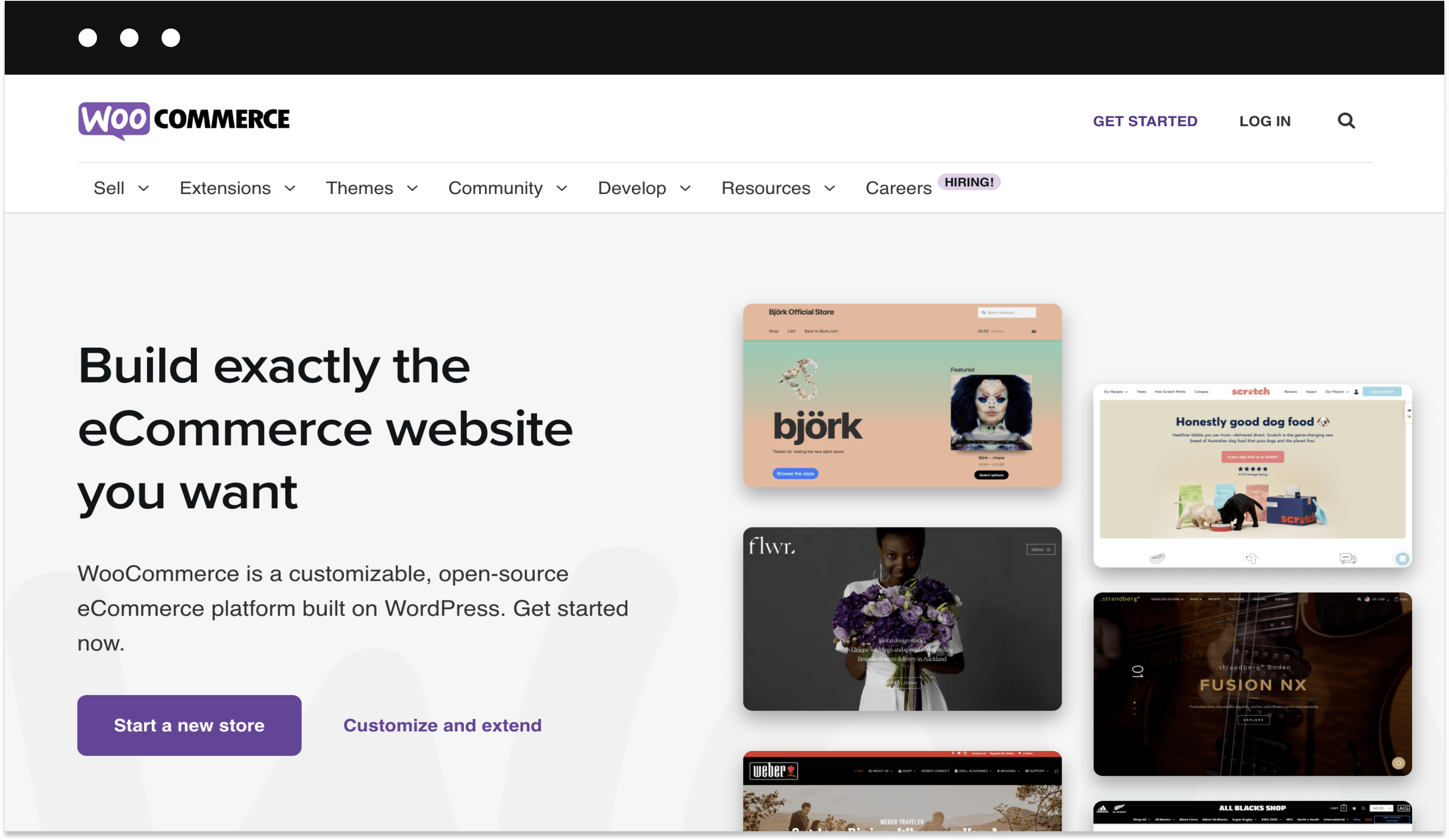
WooCommerce, a free open-source eCommerce plugin for WordPress, offers flexibility and advanced customization.
However, building an online store on this platform incurs additional costs such as hosting, themes, domain names, app integrations, and SSL certificates.
Moreover, coding knowledge or professional assistance is necessary for setup. Despite these requirements, WooCommerce remains popular due to its customization options and control over the selling process and data.

Learn how to sell online the simple way
See howIs WooCommerce right for you?
WooCommerce offers complete control over your online store, with access to thousands of themes and plugins for extended functionality (it all comes with a major learning curve, though).
How much does WooCommerce cost?
WordPress and WooCommerce are free, but remember to budget for domain name hosting, plugins, extensions, and web design services.
Pros
- No monthly fee
- Full control & advanced customization
- Many store themes and plugins
- Integrates with WordPress
Cons
- Both WordPress & WooCommerce have a huge learning curve
- WooCommerce requires an existing WordPress website
- No direct technical support
- Not the best option for beginners
7. Squarespace
Like WordPress or Wix, Squarespace started as a website builder but leaned towards creating visually unique pages. They later developed Squarespace Commerce, a fully hosted eCommerce platform.
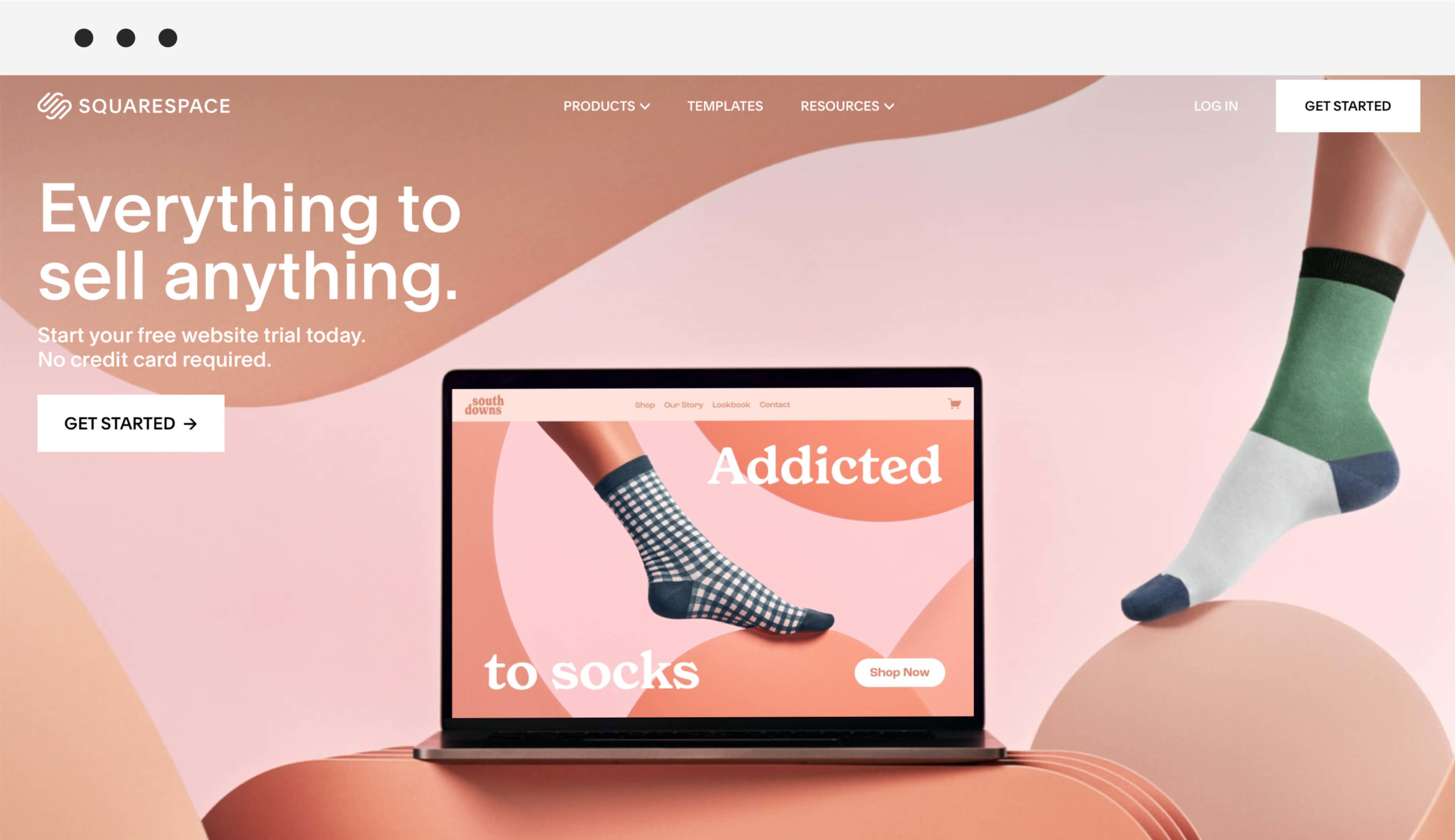
Squarespace is renowned for its visually appealing designs, allowing even non-designers to create stunning stores effortlessly. With over 80 stylish templates, you can achieve a professional look without coding.
While its features may not be as advanced as other platforms, it’s suitable for small to medium-sized businesses with unlimited product listings.
Although it offers decent drag-and-drop functionality like WordPress, it’s not the most intuitive choice for quick and easy store building.
Is Squarespace right for you?
Squarespace is an excellent website builder and eCommerce platform suitable for beginners and advanced users alike. While it has a slight learning curve, you can expect to create a modern online store relatively easily.
How much does Squarespace cost?
Squarespace offers two pricing plans: $24/month and $36/month. However, note that most marketing features are only available on the more expensive plan.
Pros
- Fully-hosted eCommerce platform
- Great choice of beautiful store themes
- The annual plan comes with a free domain name
- Unlimited number of products
- Good customer support
- Possibility to integrate on social media platforms
- Decent eCommerce features list
Cons
- Majority of marketing features on the expensive plan
- Limited payment options
- Difficult to navigate for a beginner
- Store templates aren’t fully customizable
- Not focused on eCommerce
8. Storenvy
Storenvy is a “social marketplace” where you can build your own store connected to the main marketplace. It offers marketing tools and the option to host your storefront on a custom domain.
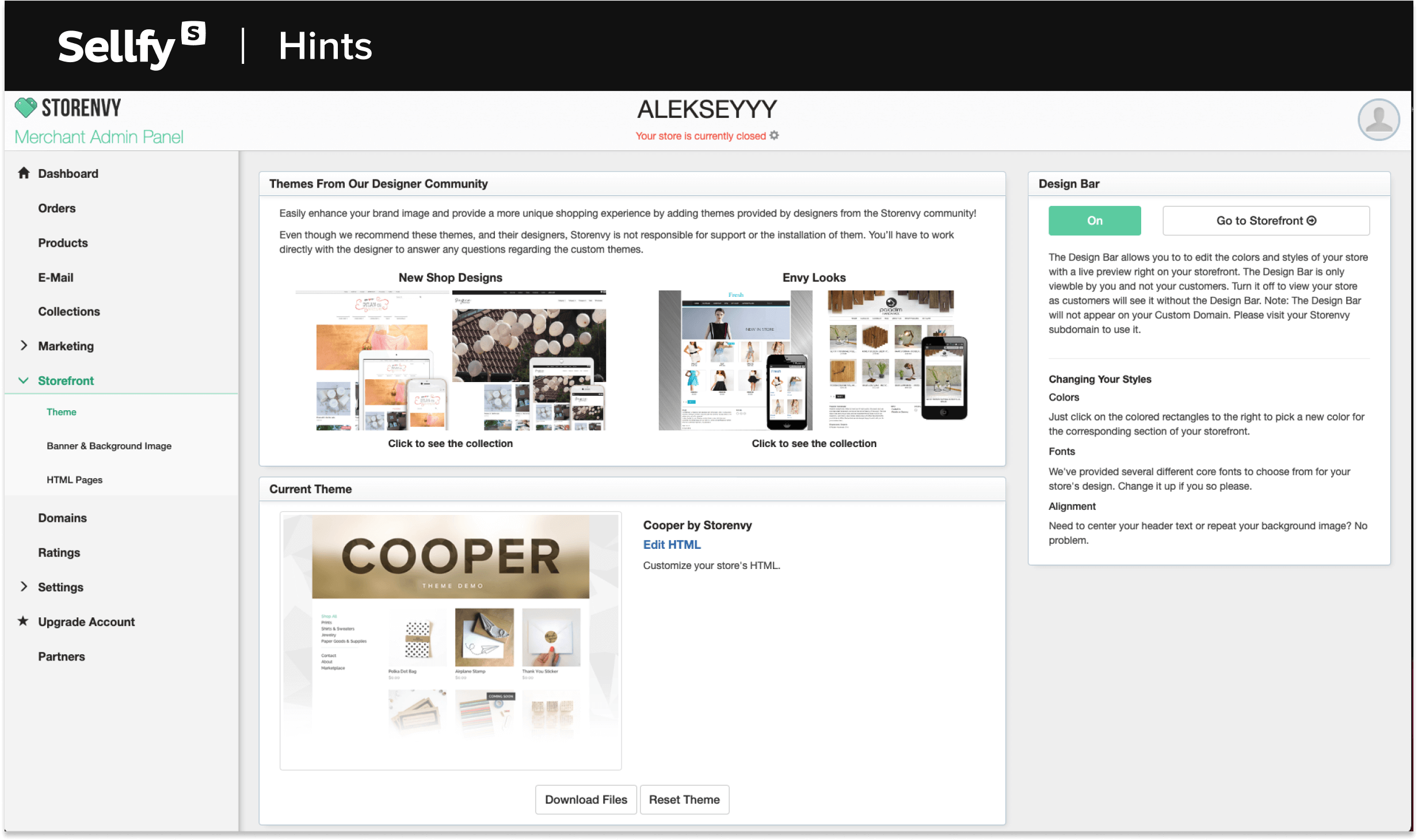
Storenvy appears user-friendly and fully customizable, with a website builder enabling CSS and HTML changes for enhanced design and technical capabilities.
However, beginners and those lacking coding experience may find Storenvy’s customization options limited and lacking in store control.
Is Storenvy right for you?
Storenvy is ideal for small independent sellers seeking a straightforward solution. It offers the benefits of an independent store combined with access to an active marketplace.
How much does Storenvy cost?
Storenvy offers a free plan allowing you to build a store and sell up to 20 products, but it charges a 15% commission on sales. It also has three paid plans priced from $9.99/month to $49.99/month.
Pros
- Access to a large marketplace
- Free plan
- Possibility to build a separate storefront
- Built-in marketing features
Cons
- Marketing features only on paid plans
- Big commissions on sold products
- Limited functionality & customization
- Marketplace isn’t as big as Etsy or eBay
9. Wix
Wix is a popular drag-and-drop website builder that enables creators to build various websites without coding. Wix Commerce allows you to start selling online directly from your Wix website.
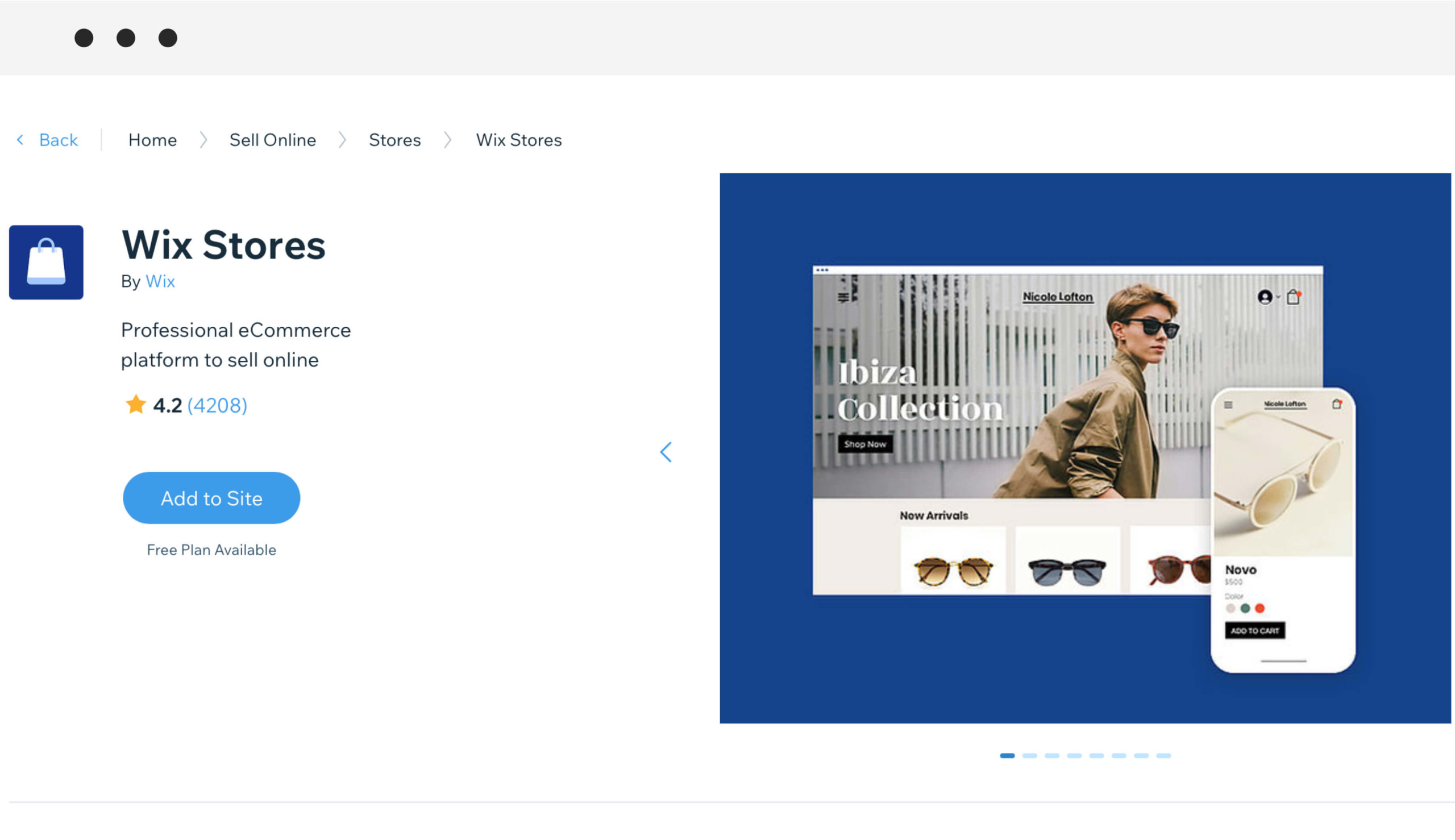
On your Wix store, you can sell various items, including physical goods and digital downloads. You can also accept bookings with a booking app, though selling services is not supported.
While Wix’s inventory management isn’t the most robust, it’s sufficient for basic store management. Wix offers impressive product presentation options, such as uploading product videos and enabling zoom on images.
Its store themes are highly customizable with drag-and-drop functionality, but once you publish a theme, you can’t change it. With Wix Code, you can access the API for advanced customizations and integrations.
Is Wix right for you?
While not as user-friendly as Big Cartel or Sellfy and lacking the quality of Squarespace themes, Wix Commerce remains a solid choice for beginners and growing businesses due to its user-friendliness and design options.
How much does Wix cost?
Wix has three eCommerce plans ranging from $23/month to $49/month.
Pros
- Extensive add-on library that doesn’t revolve around just eCommerce
- Big choice of modern store themes
- Easy to use platform
- API for advanced customizations and integrations
- A mobile app
Cons
- Lack of built-in features
- Issues with the loading speed
- Limited customization options
- No support for multichannel selling
- Many features come through costly third-party apps
10. Shift4Shop
Like Big Cartel, Shift4Shop (previously 3dcart) is a hosted eCommerce solution enabling easy store creation without prior experience. While Shift4Shop offers a free plan akin to a Big Cartel website, it’s only accessible to US citizens and includes only a native Ship4 payment gateway.

Shift4Shop provides extensive built-in eCommerce features, including marketing, SEO tools, and customer management. Paid plans include access to over 300 payment gateways and more than 100 free store themes, a significant upgrade compared to Big Cartel’s limited theme selection.
However, Shift4Shop lags behind user-friendly solutions like Sellfy. Many themes are tailored for larger businesses, making customization daunting for beginners. Product pages appear overly complex, and reports suggest technical support lacks helpfulness.

Learn how to sell online the simple way
See howIs Shift4Shop right for you?
Ideal for mid-sized or growing businesses requiring a professional store, Shift4Shop may not be the most user-friendly option.
How much does Shift4Shop cost?
There’s a free End-to-End plan for those committed to Ship4 payment gateways, along with three paid plans priced from $29/month to $229/month.
Pros
- Fully-hosted eCommerce platform
- Drag-and-drop functionality
- A free plan & three paid plans
- No transaction fees
- 300+ payment gateways
- User-friendly interface for an experienced user
- Built-in eCommerce features
Cons
- The solution isn’t easy-to-use
- No multilingual capabilities
- Reputation concerns with payment gateway
- Free templates may look too professional
- Poor customer service
- Steep learning curve
- Revenue limits on paid plans
FAQ: Big Cartel alternatives
Which Big Cartel alternative is easiest to use?
For a straightforward alternative to a Big Cartel store, Sellfy is an excellent choice. Its user-friendly interface allows easy setup and management of online stores for digital products, physical goods, or subscriptions without coding skills.
Customize your store, add products, and set up your preferred payment method. Sellfy also provides marketing tools like email campaigns and social media integration, making it a hassle-free option for online sales.
What’s the cheapest Big Cartel alternative?
For a more affordable alternative to Big Cartel, consider options like Storenvy, which offers a free plan and low fees for paid plans, or Ecwid, which also has a free plan for up to 10 products and reasonable fees for paid plans.
Choose the best option based on your needs and budget, and compare features and Big Cartel pricing before making a decision.
Which eCommerce platform has the lowest fees?
Sellfy is an eCommerce platform that doesn’t charge transaction fees, allowing sellers to keep all profits from sales without additional fees. Despite potentially lower monthly fees on other platforms, Sellfy’s lack of transaction fees can save users money over time.
English
“>”>
Related topics
Tips for creators
Join thousands of creators receiving sales tips, marketing resources, and inspiring stories. No spam, pure value.



